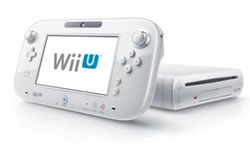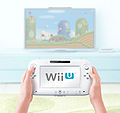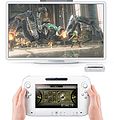| Site Notice |
|---|
|
Difference between revisions of "Wii U"
m |
(Undo revision 47362 by 172.70.126.244 (talk) Vandalism.) (Tag: Undo) |
||
| (19 intermediate revisions by 6 users not shown) | |||
| Line 11: | Line 11: | ||
|successor=[[Nintendo Switch]] | |successor=[[Nintendo Switch]] | ||
|manufacturer=Nintendo | |manufacturer=Nintendo | ||
| − | |games=[[:Category:Wii U games]] | + | |games=''[[:Category:Wii U games|List of games]]'' |
|launch_games=32<ref name="Launch US">[http://www.ign.com/wikis/wii-u/Wii_U_Launch_Games_(US) Wii U Launch Games (US)]. IGN. Retrieved June 12, 2016.</ref> | |launch_games=32<ref name="Launch US">[http://www.ign.com/wikis/wii-u/Wii_U_Launch_Games_(US) Wii U Launch Games (US)]. IGN. Retrieved June 12, 2016.</ref> | ||
| − | |best_games=''[[Mario Kart 8]]'' ( | + | |best_games=''[[Mario Kart 8]]'' ({{tt|8.42 million|as of March 31, 2018}})<ref>[https://www.nintendo.co.jp/ir/en/sales/software/wiiu.html Top Selling Software Sales Units]. Nintendo. Retrieved July 27, 2016.</ref> |
| − | |last= | + | |last=''[[The Legend of Zelda: Breath of the Wild]]'' (3/3/2017) |
|media=Wii U [[Game Disc]], Wii Game Disc, digital downloads | |media=Wii U [[Game Disc]], Wii Game Disc, digital downloads | ||
|memory=2 GB {{wp|DDR3 SDRAM}}<br>8 / 32 GB internal flash memory (+ {{tt|USB storage device|Up to 2 TB}}) | |memory=2 GB {{wp|DDR3 SDRAM}}<br>8 / 32 GB internal flash memory (+ {{tt|USB storage device|Up to 2 TB}}) | ||
| Line 22: | Line 22: | ||
|connects=[[Nintendo 3DS]], [[Wii]] | |connects=[[Nintendo 3DS]], [[Wii]] | ||
|backwards=[[Wii]] | |backwards=[[Wii]] | ||
| − | |||
|services=[[Nintendo Network]], [[Nintendo eShop]], [[Miiverse]] | |services=[[Nintendo Network]], [[Nintendo eShop]], [[Miiverse]] | ||
|launch='''NA:''' November 18, 2012<br>'''JP:''' December 6, 2012<br>'''EU:''' November 30, 2012<br>'''AUS:''' November 30, 2012 | |launch='''NA:''' November 18, 2012<br>'''JP:''' December 6, 2012<br>'''EU:''' November 30, 2012<br>'''AUS:''' November 30, 2012 | ||
| − | | | + | |discontinue=January 2017<ref name="discontinue">[http://kotaku.com/wii-u-production-has-officially-ended-for-japan-1791813878 Wii U Production Has Officially Ended For Japan]. Kotaku (January 31, 2017). Retrieved January 31, 2017.</ref> |
| − | + | |sold='''WW:''' 13.56 million<ref>[https://www.nintendo.co.jp/ir/en/sales/hard_soft/index.html Hardware and Software Sales Units]. Nintendo. Retrieved February 25, 2016.</ref><br>'''NA:''' 6.49 million<ref name="Historical Sales">[https://www.nintendo.co.jp/ir/en/finance/historical_data/index.html Consolidated Sales Transition By Region]. Nintendo (April 28, 2017). Retrieved April 28, 2017.</ref><br>'''JP:''' 3.34 million<ref name="Historical Sales"/> | |
| − | |sold=''' | ||
|colorscheme=Wii | |colorscheme=Wii | ||
}} | }} | ||
| − | |||
The '''Wii U''' is [[Nintendo]]'s eighth generation home console and was the first home console released in the generation. Unveiled during Nintendo's press conference at E3 2011 on June 7, the Wii U was released in North America on November 18, 2012, in Japan on December 6, 2012, and in Europe and Australia on November 30, 2012. | The '''Wii U''' is [[Nintendo]]'s eighth generation home console and was the first home console released in the generation. Unveiled during Nintendo's press conference at E3 2011 on June 7, the Wii U was released in North America on November 18, 2012, in Japan on December 6, 2012, and in Europe and Australia on November 30, 2012. | ||
The console launched with two models: The 8 gigabyte white "Basic Set", which comes with all basic accessories, and the 32 gigabyte black "Deluxe Set" (Premium Set in other regions), which comes with additional accessories such as a charging cradle, stands for the GamePad and console, and is bundled with one or two games. | The console launched with two models: The 8 gigabyte white "Basic Set", which comes with all basic accessories, and the 32 gigabyte black "Deluxe Set" (Premium Set in other regions), which comes with additional accessories such as a charging cradle, stands for the GamePad and console, and is bundled with one or two games. | ||
| + | |||
| + | ==Production== | ||
| + | {{stub|type=section}} | ||
| + | |||
| + | In early November 2016, after the announcement of the [[Nintendo Switch]], it was reported that Nintendo would be ending production of Wii U consoles by the end of that week, November 4.<ref>[http://www.eurogamer.net/articles/2016-11-01-nintendo-to-end-wii-u-production-this-week The final Wii U will roll off Nintendo's production line this week]. Eurogamer (November 1, 2016). Retrieved December 4, 2016.</ref><ref>[http://www.ign.com/articles/2016/11/01/nintendo-reportedly-ending-wii-u-production-this-week Nintendo Reportedly Ending Wii U Production This Week]. IGN (November 1, 2016). Retrieved December 4, 2016.</ref> Despite a Nintendo spokesperson claiming that the report was false<ref>[http://kotaku.com/nintendo-denies-the-wii-u-production-is-ending-this-wee-1788479584 Nintendo Denies Wii U Production Is Ending This Week]. Kotaku (November 2, 2016). Retrieved December 4, 2016.</ref>, Nintendo later posted on its Japanese website that all currently available Wii U bundles at the time would be ending production in the near future.<ref>[http://kotaku.com/nintendo-announces-wii-u-production-is-ending-1788802568?utm_campaign=Socialflow_Kotaku_Twitter&utm_source=Kotaku_Twitter&utm_medium=Socialflow In Japan, Nintendo Announces Wii U Production Is Ending]. Kotaku (November 10, 2016). Retrieved December 4, 2016.</ref> A representative from Nintendo would later confirm the news on the website, as well as stating that all Wii U hardware to be available for the next fiscal year in North America had already been shipped to retailers.<ref>[http://www.ign.com/articles/2016/11/10/nintendo-officially-announces-wii-u-production-is-ending-in-japan?read Nintendo Officially Announces Wii U Production Is Ending]. IGN (November 10, 2016). Retrieved December 4, 2016.</ref> On January 31, 2017, Nintendo of America confirmed that Wii U production had been discontinued worldwide, after an update on the Japanese website revealed that system production had ended for that region.<ref name="discontinue"/> | ||
==Features== | ==Features== | ||
| Line 48: | Line 50: | ||
Physical games for the Wii U are released on [[Game Disc|Wii U Game Discs]], an extension of Nintendo's previous Game Disc formats. The format is similar to a [[wikipedia:Blu-ray|Blu-ray disc]], in that a Wii U Game Disc can hold up to 25 GB of data.<ref>[http://kotaku.com/5809701/wii-u-discs-will-be-25gb-in-size Wii U Discs Will Be 25GB In Size]. Kotaku (June 7, 2011). Retrieved June 13, 2016.</ref> Wii U games can also be purchased digitally and downloaded onto the system from the [[Nintendo eShop]]. In addition to original games, players can also download [[Virtual Console]] titles from the Nintendo eShop, as well as download versions of select retail Wii games. | Physical games for the Wii U are released on [[Game Disc|Wii U Game Discs]], an extension of Nintendo's previous Game Disc formats. The format is similar to a [[wikipedia:Blu-ray|Blu-ray disc]], in that a Wii U Game Disc can hold up to 25 GB of data.<ref>[http://kotaku.com/5809701/wii-u-discs-will-be-25gb-in-size Wii U Discs Will Be 25GB In Size]. Kotaku (June 7, 2011). Retrieved June 13, 2016.</ref> Wii U games can also be purchased digitally and downloaded onto the system from the [[Nintendo eShop]]. In addition to original games, players can also download [[Virtual Console]] titles from the Nintendo eShop, as well as download versions of select retail Wii games. | ||
| − | The Wii U is also backwards-compatible with all Wii titles, which can be played | + | The Wii U is also backwards-compatible with all Wii titles, which can be played by accessing Wii Mode. This also applies to [[WiiWare]] and Virtual Console titles, which can be transferred to the Wii U's Wii Menu in Wii Mode using the [[Wii U Transfer Tool]] and [[Wii System Transfer]] tool, an internet connection, and an SD card<ref>[http://en-americas-support.nintendo.com/app/answers/detail/a_id/1124/~/how-to-transfer-content-from-a-wii-to-a-wii-u How to Transfer Content from a Wii to a Wii U]. Nintendo Support. Retrieved December 4, 2016.</ref>. Select Wii games are also available as downloads on the Nintendo eShop, which still run in Wii Mode. |
==Accessories== | ==Accessories== | ||
| Line 74: | Line 76: | ||
===Wii accessories=== | ===Wii accessories=== | ||
Being backwards compatible with the Wii console, the Wii U is compatible with all of the Wii's controllers and accessories, including the [[Wii Remote]] and [[Nunchuk]], [[Classic Controller|Classic Controller / Classic Controller Pro]], [[Wii Sensor Bar|Sensor Bar]], and [[Wii Balance Board|Balance Board]]. By extension, peripherals such as the [[Wii Wheel]] and [[Wii Zapper]], can also be used with the Wii U. | Being backwards compatible with the Wii console, the Wii U is compatible with all of the Wii's controllers and accessories, including the [[Wii Remote]] and [[Nunchuk]], [[Classic Controller|Classic Controller / Classic Controller Pro]], [[Wii Sensor Bar|Sensor Bar]], and [[Wii Balance Board|Balance Board]]. By extension, peripherals such as the [[Wii Wheel]] and [[Wii Zapper]], can also be used with the Wii U. | ||
| + | |||
| + | The Wii U is also compatible with USB-based Wii hardware, such as the [[Wii LAN Adapter]] and [[Wii Speak]]. | ||
==Gallery== | ==Gallery== | ||
| Line 86: | Line 90: | ||
==External links== | ==External links== | ||
| + | {{Otherwikis|collapsed=yes|Bulbapedia=1|Fire Emblem Wiki=1|Inkipedia=1|Lylat Wiki=1|Nookipedia=1|Pikipedia=1|SmashWiki=1|Starfy Wiki=1|StrategyWiki=Category:Wii U|Super Mario Wiki=1|WiKirby=1|Zelda Wiki=1}} | ||
*{{wp|Wii U|Wii U on Wikipedia}} | *{{wp|Wii U|Wii U on Wikipedia}} | ||
| + | {{-}} | ||
==References== | ==References== | ||
| Line 94: | Line 100: | ||
{{Nintendo console}} | {{Nintendo console}} | ||
[[Category:Consoles]] | [[Category:Consoles]] | ||
| − | |||
Latest revision as of 13:34, 13 September 2023
| Wii U Wii U | ||||||||||
| ||||||||||
| ||||||||||
| ||||||||||
| ||||||||||
| ||||||||||
|
The Wii U is Nintendo's eighth generation home console and was the first home console released in the generation. Unveiled during Nintendo's press conference at E3 2011 on June 7, the Wii U was released in North America on November 18, 2012, in Japan on December 6, 2012, and in Europe and Australia on November 30, 2012.
The console launched with two models: The 8 gigabyte white "Basic Set", which comes with all basic accessories, and the 32 gigabyte black "Deluxe Set" (Premium Set in other regions), which comes with additional accessories such as a charging cradle, stands for the GamePad and console, and is bundled with one or two games.
Contents
Production
| This section is a stub. You can help NintendoWiki by expanding it. |
In early November 2016, after the announcement of the Nintendo Switch, it was reported that Nintendo would be ending production of Wii U consoles by the end of that week, November 4.[6][7] Despite a Nintendo spokesperson claiming that the report was false[8], Nintendo later posted on its Japanese website that all currently available Wii U bundles at the time would be ending production in the near future.[9] A representative from Nintendo would later confirm the news on the website, as well as stating that all Wii U hardware to be available for the next fiscal year in North America had already been shipped to retailers.[10] On January 31, 2017, Nintendo of America confirmed that Wii U production had been discontinued worldwide, after an update on the Japanese website revealed that system production had ended for that region.[3]
Features
The Wii U is the first Nintendo console capable of outputting high-definition video, able to natively display at 1080p resolution. The console can output video and audio via either HDMI output, or a Wii-compatible video output cable; however, the console cannot output video through both at the same time.
The main feature of the Wii U is the Wii U GamePad controller, which has its own touch-sensitive display through which the console can output video in addition to the television screen. Using the GamePad, the player can interact with the game using the touch display, or play the game using the GamePad display rather than the TV.
The Wii U features built-in backwards compatibility for the Wii, able to play all of the system's games and natively supports all controllers and accessories. While Wii controllers can be used in Wii U games, Wii games and software can only be played in "Wii mode", which takes the console to an emulated version of the Wii menu.
Games
| Main article: Category:Wii U games |
Over 700 games have been released for the Wii U to date, both physically and digitally. In North America, the Wii U launched with 32 titles[1], while 24 were available at launch and confirmed to be released within the launch window in Europe[11]
Physical games for the Wii U are released on Wii U Game Discs, an extension of Nintendo's previous Game Disc formats. The format is similar to a Blu-ray disc, in that a Wii U Game Disc can hold up to 25 GB of data.[12] Wii U games can also be purchased digitally and downloaded onto the system from the Nintendo eShop. In addition to original games, players can also download Virtual Console titles from the Nintendo eShop, as well as download versions of select retail Wii games.
The Wii U is also backwards-compatible with all Wii titles, which can be played by accessing Wii Mode. This also applies to WiiWare and Virtual Console titles, which can be transferred to the Wii U's Wii Menu in Wii Mode using the Wii U Transfer Tool and Wii System Transfer tool, an internet connection, and an SD card[13]. Select Wii games are also available as downloads on the Nintendo eShop, which still run in Wii Mode.
Accessories
Controllers
Wii U GamePad
| Main article: Wii U GamePad |
The Wii U GamePad is the main controller for the Wii U. Its primary feature is the touchscreen, which can be used for both displaying the television screen, or be implemented for asymetric gameplay. The controller uses a modified Wi-Fi signal to connect to the console, which streams video to the GamePad. In addition to all of the standard buttons as seen on the Classic Controller, along with the power button and clickable control sticks, the Wii U GamePad also features an NFC sensor, headphone jack, external microphone jack, gyroscope, camera, and infrared sensor. The GamePad can also be used as a television remote.
Wii U Pro Controller
| Main article: Wii U Pro Controller |
The Wii U Pro Controller is a more standard controller meant to be an alternative to the GamePad. It features the same standard buttons, but lacks most of the GamePad's features, including its touchscreen. The Pro Controller was released alongside the Wii U, though as a standalone product rather than being packed with the console.
Wii U Microphone
| Main article: Wii U Microphone |
The Wii U Microphone is an accessory that allows for vocal input in compatible software. The accessory connects to the system through one of its USB ports.
Nintendo GameCube Controller Adapter
| Main article: Nintendo GameCube Controller Adapter |
The Nintendo GameCube Controller Adapter is an accessory that allows players to use Nintendo GameCube Controllers with compatible Wii U software. The accessory connects to the console using two USB connectors, and the adapter features four Nintendo GameCube Controller ports. The adapter and Nintendo GameCube Controllers can only be used with Super Smash Bros. for Wii U.
amiibo
| Main article: amiibo |
amiibo are toys-to-life product that can unlock content and be used in other ways in various compatible games. They can be used with Wii U software by touching them to the NFC sensor on the Wii U GamePad. amiibo launched with the Super Smash Bros. line on November 21, 2014, the same day as the first amiibo-compatible game, Super Smash Bros. for Wii U.
Wii accessories
Being backwards compatible with the Wii console, the Wii U is compatible with all of the Wii's controllers and accessories, including the Wii Remote and Nunchuk, Classic Controller / Classic Controller Pro, Sensor Bar, and Balance Board. By extension, peripherals such as the Wii Wheel and Wii Zapper, can also be used with the Wii U.
The Wii U is also compatible with USB-based Wii hardware, such as the Wii LAN Adapter and Wii Speak.
Gallery
The tech demo New Super Mario Bros. Mii being played on the TV.
The tech demo Zelda HD Experience being played on the TV, with the GamePad showing the inventory.
External links
Wii U on other NIWA Wikis: | ||||||||||||||||||||||||
|---|---|---|---|---|---|---|---|---|---|---|---|---|---|---|---|---|---|---|---|---|---|---|---|---|
|
References
- ↑ 1.0 1.1 Wii U Launch Games (US). IGN. Retrieved June 12, 2016.
- ↑ Top Selling Software Sales Units. Nintendo. Retrieved July 27, 2016.
- ↑ 3.0 3.1 Wii U Production Has Officially Ended For Japan. Kotaku (January 31, 2017). Retrieved January 31, 2017.
- ↑ Hardware and Software Sales Units. Nintendo. Retrieved February 25, 2016.
- ↑ 5.0 5.1 Consolidated Sales Transition By Region. Nintendo (April 28, 2017). Retrieved April 28, 2017.
- ↑ The final Wii U will roll off Nintendo's production line this week. Eurogamer (November 1, 2016). Retrieved December 4, 2016.
- ↑ Nintendo Reportedly Ending Wii U Production This Week. IGN (November 1, 2016). Retrieved December 4, 2016.
- ↑ Nintendo Denies Wii U Production Is Ending This Week. Kotaku (November 2, 2016). Retrieved December 4, 2016.
- ↑ In Japan, Nintendo Announces Wii U Production Is Ending. Kotaku (November 10, 2016). Retrieved December 4, 2016.
- ↑ Nintendo Officially Announces Wii U Production Is Ending. IGN (November 10, 2016). Retrieved December 4, 2016.
- ↑ Wii U Launch Games (UK). IGN. Retrieved June 12, 2016.
- ↑ Wii U Discs Will Be 25GB In Size. Kotaku (June 7, 2011). Retrieved June 13, 2016.
- ↑ How to Transfer Content from a Wii to a Wii U. Nintendo Support. Retrieved December 4, 2016.
| This article is a stub. You can help NintendoWiki by expanding it. |
|
|
| |||||||||||||||||||||
| |||||||||||||||||||||
| |||||||||||||||||||||






